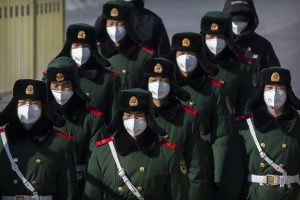Diplomat author Mercy Kuo regularly engages subject-matter experts, policy practitioners, and strategic thinkers across the globe for their diverse insights into U.S. Asia policy. This conversation with George Magnus – Research Associate at China Centre, Oxford University and the School of Oriental and African Studies in London and author of Red Flags: Why Xi’s China is in Jeopardy (Yale University Press 2018) – discusses the economic and political fallout from the coronavirus outbreak in China.
What is the economic impact of coronavirus in China?
In the three weeks since this public health scare was brought to the attention of President Xi Jinping, large swathes of the public transportation, tourism, leisure, and retailing networks have shut down. Anecdotal reports indicate many factories, shops, places of work, banks, and schools and universities have been disrupted. Tens of millions of people will have been affected, and so we should expect a considerable impact on the economy in the first quarter 2020 at least. Economic growth could have lost about 2 or more percentage points.
How bad it all gets depends on how long it takes for the authorities to stabilize the virulent infection rate and provide antidotes. The sooner it is under control, the more likely the economy will snap back. But if crisis measures are still in place in March, or even later, I’d expect the economic effects to be accordingly larger, and take longer to shake off.
What is the global economic impact of coronavirus?
International air travel has been badly affected, with many global airlines cancelling flights to and from China. Tourist flows in and out of China have therefore been disrupted, and many countries in Asia and in the West, which have come to recognize the rising significance of Chinese tourist bookings and spending, will be wondering when things will normalize again.
Supply chains are being hit too. So, companies making things in Malaysia, say, or in Minnesota that depend on Chinese-made parts or goods being shipped over may find supplies drying up and prices rising. This is because of the shutdown of factories and the delays in workers returning from Chinese New Year holidays, which have been extended because of the virus. Sales of luxury goods and automobiles in China will have been hurt by the quarantining of tens of millions of people, and closures of work and shops, including Toyota and Volkswagen, Apple, McDonalds, and Starbucks. Many firms will be experiencing revenue shortfalls and lower business volumes. Commodity prices have fallen, notably copper – a bellwether of Chinese industrial and real estate health.
The numbers hit to global growth may not be large, but given we were not all that optimistic to start with about the global economy, trade war and so on, the virus’ impact is nonetheless unwelcome.
Assess China’s governance, transparency and political leadership in tackling the coronavirus nationwide.
Serious questions abound about why it took 40 days from the recognition of the first virus cases in Wuhan to the point where President Xi declared an emergency; why a number of doctors in Wuhan who tried to warn about the virus were punished; why party officials seemed to be reluctant to admit to the risks of which they were being warned, and even continued to plan public new year events right up to the point of the emergency being called. Other questions relate to the preparedness of public health authorities for this kind of virus outbreak, and to public health, food, and animal market safety regulations that may have propagated the infection.
Once it became clear that a new and potentially serious virus had hatched, and the urgency had flowed up to President Xi, the authorities went into crisis mode, and responded promptly at home and by passing on information to global health authorities. But that it took so long to get that stage speaks to a political problem about the party’s obsession with stability, control, and messaging, and its tendency to suppress the free flow of information and transparency.
How does the coronavirus crisis fit into the “red flags” framework articulated in your book Red Flags?
Red Flags is about macroeconomic phenomena that are challenging China over the medium term, not hopefully short-lived public health scares. Nevertheless, it is also, importantly, about the capacity of the Communist Party under Xi Jinping to respond and react, and to meet challenges successfully. It’s about governance, in other words. The longer-term consequences of the virus infection may be less economic, as such, and more related to what it reveals about the capacity of the party to preempt and manage shocks, and the degree to which its craving for stability and discipline stifles debate and essential information that politics deem unwelcome. These shortcomings are of great significance for macroeconomic and technological competence and development.
Explain why Western policymakers and business leaders should be concerned about China’s management of health security and economic policy.
The simple reason is because of China’s high level of integration into the global economic system, from trade and tourism to supply chains and all forms of commerce. In short, China matters in ways that weren’t relevant before. It used to be said that when the U.S. economy caught the flu, the rest of the world would sicken. This is equally true of China nowadays, also literally.
The problem nowadays is that greater distrust and hostility have emerged in the relationship between the West and Xi Jinping’s China. If, as many believe, a more authoritarian China with, in effect, one-man rule has now planted firm roots, we should worry that it is likely to nurture the very instability and unpredictability it was created to counter.
































